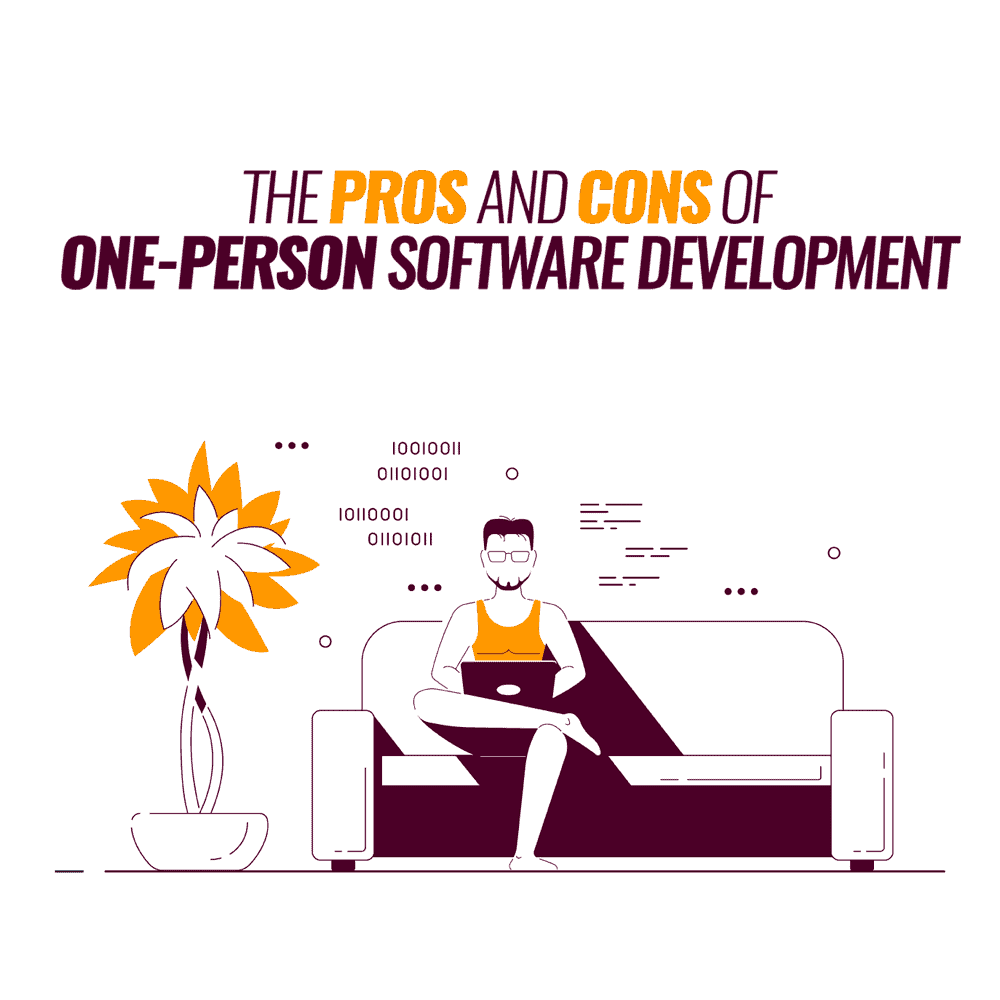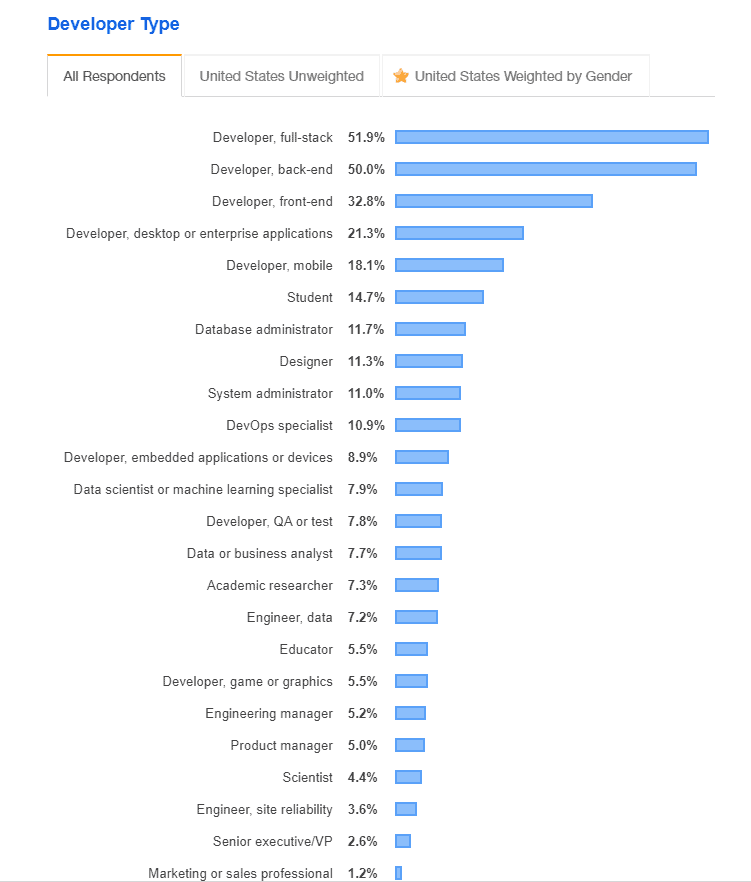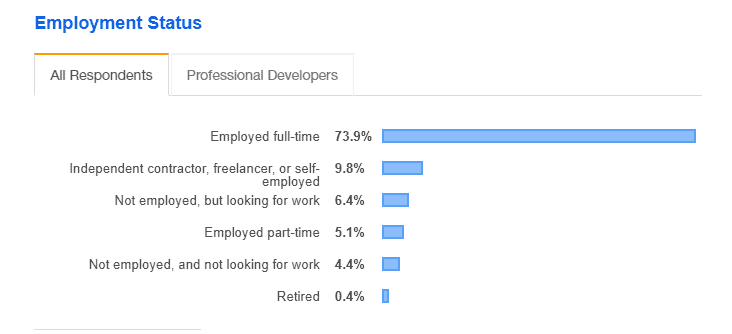 When it comes to software development, we usually imagine big companies with numerous teams of software engineers engaged in large-scale projects. The noise of open spaces, constant collaboration, brainstorming, and team-building events are all familiar attributes of the day-to-day software development reality.
When it comes to software development, we usually imagine big companies with numerous teams of software engineers engaged in large-scale projects. The noise of open spaces, constant collaboration, brainstorming, and team-building events are all familiar attributes of the day-to-day software development reality.
However, such a collaborative working style isn’t universal. There are at least three scenarios when software engineers work alone:
- Freelance software developers who work as independent technology consultants.
- Software developers who work in one-person IT departments.
- Software developers who participate in projects without a team or have a unique specialization.
But why do software specialists happen to work alone? For some professionals, solo work is a well-weighted decision that comes from their intention to manage their working activities independently and to choose projects, technologies, and customers freely.
For others, solo work is just a conjunction of circumstances. Their teammates can leave a company or can be laid off, or the projects they participate in might require just one specialist with specific knowledge.
So, whether you are thinking about starting a software development career on your own or you have already engaged in a solo working style, this article can be good food for thought. We will analyze every scenario of one-person work to discover the benefits and challenges that are characteristic of each of them, as well as explore the skills needed to be a successful independent software developer.
Freelancing: Being Your Own Boss
Some start their freelancing path right from college, others switch to freelancing after getting their experience as team players. Oftentimes, tired of corporate life, unsatisfied with projects and salary, and inspired with the role models of self-made icons, such as Satoshi Nakamoto who changed the world by inventing bitcoin, engineers of all grades decide to start their own one-person business.
According to Stack Overflow’s 2019 Developer Survey, almost 10% of software developers permanently work as freelancers.
But what motivates software developers to go freelance?
- More freedom and flexibility of the working style, including the timetable, workload, and types of projects.
- A greater focus on their preferred tech stack. As a freelancer, you are always free to reject projects that aren’t interesting for you technology-wise.
- Broader working geography. Not only can you collaborate with customers from all over the world, but you can also choose the country to live in without being attached to a specific office location.
- You can control your income and substantially increase your average paycheck.
While freelancing may sound like a dream, this freelancing freedom has a flipside.
You are the only one who can fill your working hours. No one else can bring you projects or customers on a silver platter. Finding jobs over and over again may take a lot of time while your effort can be rewarded much less than you expected at the start.
It’s also impossible to ignore the importance of soft skills for a successful developer’s career. Freelance software development requires tech-minded people to become their own sales and marketing managers to promote and sell their services and competences, as well as communicate with customers, technology vendors, and third-party software providers.
Your income can be unstable. Logically, if there are no customers on the horizon, you won’t get paid. What’s more, even if you have stable projects and customers, they can delay or postpone payments, so you’d better have some money set aside for paying your bills during a dull season.
You can get overloaded. While some freelancers might have idle time, others can hardly find a free minute. By getting engaged in multiple projects, it’s easy to end up with more tasks than you have ever had or can physically bear. As a result, many freelancers exhaust themselves by working day and night without day-offs and vacations.
Other issues freelancers often face are loneliness, lack of time for learning, knowledge gaps, and a huge responsibility for every aspect of their professional activities. Some specialists find freelancing disadvantages critical, which makes them return to the habitual office-based work.
Say ‘Yes’ to freelancing: if you aren’t afraid of challenges and are ready to become your own business manager wearing multiple hats. It’s also a good choice for specialists with well-developed soft skills and great self-discipline.
Say ‘No’ to freelancing: if you got used to the stability of office work and regular monthly salary and you don’t feel like managing related activities (accounting, customer communication, reporting, etc.) by yourself.
Working in a One-Person IT Department: Being a Generalist
On the one hand, the number of full-stack software developers all over the world keeps growing. This means that more and more enterprises are interested in a broader set of software developers’ skills and prefer specialists who can handle front and back-end technologies equally well.
On the other hand, smaller businesses often don’t want to invest in a dedicated IT department but prefer hiring a programmer who can handle a broad set of software-related challenges. Thus, organizations might look for a professional who is experienced in software development, system and network administration, information security, and other aspects of a digital enterprise.
My first employer was exactly like this. At our company, there was just one in-house professional who developed software solutions, supported all the corporate IT infrastructure, and was responsible for physical and virtual security.
Such multitasking can be attractive for software specialists in many ways:
- You can work on diverse IT aspects. There is almost no risk of being stuck in a rut. Generalists can get engaged in versatile activities, which can boost their engagement and prevent them from feeling bored.
- Your only customer is your employer. When specialists manage internal software and infrastructure, their workload and results don’t directly depend on their employers’ customers, which guarantees the income and stream of tasks are stable.
- You can constantly extend your professional outlook. Since generalists deal with diverse tasks, they have to level up their skills and knowledge constantly. You can convince your boss to invest in your education and enroll in the most relevant training or dedicate your time to self-education.
At the same time, generalists may stumble upon the downsides of their professional path and even get criticized by their more narrow-focused colleagues. The potential pitfalls include:
Knowing everything without knowing it in-depth. Being a generalist often means doing many things without being a true expert in any of them. Generalists have a very broad range of duties and can lack the opportunity to focus on specific technologies. As a result, their degree of knowledge might be inconsistent across technologies.
In this regard, software development professionals highlight that even though companies think they look for generalists, in reality, they expect their employees to have deeper knowledge in at least one specific domain. This narrower specialization, aka T-shaped knowledge, makes generalists closer to specialists and increases their market value.
Demonstrating poor outcomes due to multitasking. Having to juggle tasks, generalists may find it difficult to fulfill their duties properly. The lack of time management and project management skills can also end badly, as an employee may forget some tasks, confuse their priority, or do some of them incorrectly.
Lagging behind other software developers. When you work alone at a particular company, you are laser-focused on this company’s needs and may ignore industry trends and technological updates. As a result, you may become a one-company specialist who can hardly apply your expertise in any other environment.
Say ‘Yes’ to generalism: if you are interested in various aspects of the software development domain and don’t plan to specialize in a particular technology. It is also a good career choice for those who are keen on infrastructure support and are ready to become multitasking professionals.
Say ‘No’ to generalism: if you are digging into a specific software development area and want to become a narrow specialist; if you aren’t ready to deal with both software and hardware at once; if you prefer working in large IT departments.
Solo Work: Reckoning on Yourself Only

- An outsourced specialist gets engaged in a project without his or her team. There might be a customer’s team on the other side, but a programmer still works without the support of their mates.
- A specialist works in a small team and is responsible for a specific technology, with no other specialists sharing a similar specialization.
For some programmers, this scenario can be optimal for several reasons:
- They don’t have to compete with colleagues having similar expertise.
- They can learn their technology’s ins and outs and apply their knowledge in complex projects.
- They can collaborate with global teams and get experienced in cross-border communication.
Like other styles of independent work, solo work also has its drawbacks.
No peer support. You don’t get the chance to ask for advice or discuss a challenge with your peers. As a result, it is easy to make a mistake that can have a major detrimental effect on the project.
To avoid mistakes, it’s reasonable to actively use corporate knowledge sources. Some companies use SharePoint as a knowledge management system or a corporate wiki, others offer guidance on various aspects of software development projects, ready-to-use storages with custom code, developers’ life hacks, and expert recommendations.
No breaks. If a project lasts long, it can be hard to take a vacation or a sick leave, because there is no similar professional to back you up.
No chance to keep silent. You also have to be good at communication to comfortably collaborate with customers and third-party teams.
Say ‘Yes’ to solo work: if you are well-versed in your domain and are ready to take project-related responsibilities without help from colleagues.
Say ‘No’ to solo work: if you are not confident about your knowledge and aren’t ready to handle tasks without extra support.
Your Must-haves for a Successful Solo Career
Regardless of the working scenario, the life of an independent software developer isn’t easy and brings many challenges to those who chose it.
So what qualities and skills should a good independent software developer have?
One of the greatest challenges of working alone is to take on the roles of different specialists. So apart from being a tech pro, you have to extend your competencies with must-have soft skills, including communication, and time management, as well as set up your reporting and accounting processes if you are a freelancer.
It is also about taking full responsibility for every decision you take and every piece of code or service you deliver. Since there is no one to prevent you from failing, you should be ready to face challenges and always have a plan B.
At the same time, a solo career is a great chance for software specialists to try themselves at various domains of software development, boost their hard and soft skills, and forge unique competences. As a solo worker who is away from the teamwork pressure and competition, you can show more impressive results, be more productive, and happier with the job you do.


